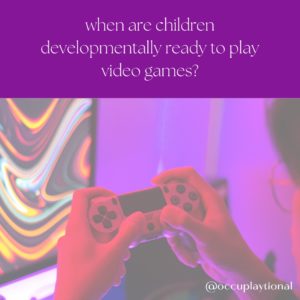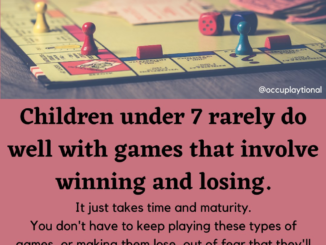
On my recent post about children being developmentally ready for games with winning and losing, somebody asked me if the same information applied to video games, which was a great question.
I think the umbrella term “video games” is pretty huge, and that sometimes makes it really hard to talk about what we’re talking about.
Some “video games” — more common with phone/tablet apps, in my experience, as opposed to console or computer games — are basically, straight up and down, gambling. They’re engineered to hook their audience and they “pay out” (whether that’s in-game rewards, or things that cost actual money) just often enough to activate the brain centers to think that they’re winning enough to make it worthwhile. These tactics are what keep adults addicted to gambling, let alone children with underdeveloped brains. This is an extra kind of predatory that I don’t really see paralleled in the stakes of board, card, family games.
Some “video games” are…a million other things. I mean, someone can say “video games” and mean a family game of Mario Kart, where all the players are in the same room, and in the same family, with multiple controllers, playing the way that they might also sit around and play a board game. Or they might mean their child playing a game alone, or with friends who are not in the same room as them but are online, or with people they don’t know online. The game might be fast-paced and intense, it might be slower and more exploratory, it might be story-based, it might be open-ended and about building things, it might be solving puzzles or completing quests or any mix of these things or a dozen other things.
And the reason why kids get frustrated with them can vary just as much. “Losing” sometimes means that the game is over and some other person (playing side by side, or somewhere on the internet) has won. “Losing” sometimes mean that the character has lost a life or experienced some in-game setback but it’ll pick right back up where they left off. Some games don’t have “losing”, but a child could be frustrated for some other reason to do with the game.
There are video games that are age appropriate even for babies and young toddlers, which (hopefully!) don’t have a “losing” condition attached to them at all. They might involve clicking on different parts of the screen and hearing a story read, or exploring a scene and watching different animals, characters, or objects react, or drawing, colouring or creating, or a million other things.
I do think that for older children, video games have the potential to be very different than board games. Even if you took the absolute most board-game-like video games — Words with Friends or some other game where it’s literally a digital, online version of an existing board game — there’s still oftentimes a unique element of losing to some faceless person (or computer AI) who you don’t know and don’t see and may or may not have been having mutual fun with before the loss.
Decisions about what video games are appropriate for which child, at which age or stage of development, are very personal and very family-specific. Being aware of the vast range in types of video games and types of considerations might help give you language to organize your own thoughts or have a discussion with your co-parent, or with your child (depending on their age and cognitive level), about what you think is appropriate for them. Consider what the type of game that they’re wanting to play is, what its mechanics are, what “losing” entails or whether this game has “losing”, what your child’s frustration tolerance is, what their reaction to frustration usually is. There are lots of cooperative, or just open-world, video games out there where there is no “losing”.
There might still be frustrating elements. Some of them you might be able to help your child with, or turn the video game into a shared time for connecting: for example, I know I have friends who have played their own favorite story-based games with their young children, who wouldn’t have been able to play it alone because they couldn’t read the text on the screen, but their adult reads the text along with them and lets the child make the story decisions. Or, a child who lacks the coordination to play a more complicated game, but snuggles up with their parent and does the parts of the game that they’re capable of, while their adult handles the parts that require more speed or finesse.
(I have fond memories of sitting and watching my two younger brothers play through video games. As a child, and still as an adult, I adore video games’ capacity for incredible storytelling — yet I have very little desire to play them myself. I used to sit and watch my brothers play 98% of games, but they knew I was really good at mashing the button on the controller way faster than they were, so on the rare occasion when the game would have a button-mashing challenge, I would take over for just a minute or two and then happily hand it back off to them and keep watching the story!)
Lastly, I think it’s important to talk to your children, especially as they get older, about the nature of the way that some games are engineered to take advantage of people. this is part of just discussing the way that advertising and capitalism works in our society in general. In-game advertising on “free” games, “pay to win” type concepts or in-game currency, etc, are all topics that you can discuss naturally with children as they get older so that they are aware of the way that products are built to keep them as consumers.

